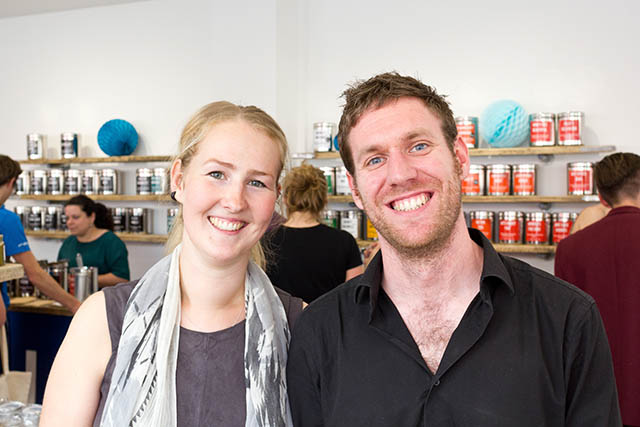Bird & Blend started out in a bedroom belonging to the parents of co-founder Kristina Smith. Together with co-founder (and now husband) Mike Turner, Kristina began experimenting with such out-there tea flavours as Bonfire Toffee, Rhubarb & Custard and Strawberry Lemonade.
The couple borrowed £25,000 from the government to open their first shop in Brighton in 2014, before turning to equity crowdfunding website Crowdcube to raise another £365,000.
Today, Bird & Blend has seven shops in affluent towns and cities including Tunbridge Wells, Bristol and the trendy London areas of Borough and Angel. However, Mike and Kristina see the shops as showrooms for their burgeoning online business. Bird & Blend expects to reach £3 million turnover this year.
The pair have taken a similarly innovative approach to fundraising, issuing a “tea bond” to investors – which repaid lump sums with interest – and borrowing money from their credit card provider in exchange for paying higher transaction charges over three months.
Co-founder Mike Turner, 30, tells Growth Business about the challenges of learning different types of management styles, the attraction of crowdfunding and the importance of not missing out on the big picture.
Where did the idea for your business come from?
Krisi had worked in the tea industry for a few years and had felt that it was becoming a little stale and there was space to create something more exciting. I was working in customer service and felt that combining exciting blends with a really great customer experience could be really innovative.
What experience do you have in your sector?
Prior to starting Bird & Blend, Krisi had worked for a couple of tea companies in the UK and North America. I had worked in hospitality (pubs, hotels and teaching skiing).
Do you consider your business to be a disruptor – what’s its USP?
Absolutely! The tea industry can be a bit bland with a lot of companies serving very similar things and the service can be quite patronising and snobby. Something as fun as bringing fresh, exciting flavour concepts to this industry and then wrapping them in a fun customer experience is totally disruptive.
What part does technology play in the business?
We started off online and this still makes up a significant chunk of the business. We’re currently trialling a bot with the potential to bring a far more personal feel to our online customers.
In stores, we use technology to provide data to help drive decision making, including a fairly advanced Epos system and footfall tracking.
What funding did you have to start the business and where did it come from?
We initially started the business using credit cards and some savings we had pulled together. When we came to open a store we took out a start-up loan to fund it.
As the business has grown what are the major challenges you have faced, and have you overcome them?
Our fast growth has meant that we regularly have to restructure the business. That creates its own challenges. Personally, going from doing everything ourselves to having a small team, then hiring managers and now senior managers has meant that we have had to quickly adapt to the differing management styles these levels require.
Have you turned to external finance to grow? If so, what type – debt or equity?
We have at different times used both debt and equity. We have used debt for short term, or bridging options, in the forms of loans, overdrafts and a ‘tea bond’ a few years ago. We also raised money through an equity crowdfund a couple of years ago to drive growth.
What would you say to any other small business owner mulling whether to bring in outside investors?
It’s something that definitely needs careful thought, but as long as you have people who get your long-term thinking and you get on with, I think it can add a lot of value. For us, we have 286 investors who have invested from £50 to significantly more. This means that we have a small number of investors who have put in quite significant stakes, and we’re able to reach out to for advice, but we’re not reliant on any individual investors.
How do you measure success for yourself, your investors, you staff and your customers?
We take a long-term view, so as long as customers continue to be excited with what we’re doing and asking us to open new stores closer to them, we think we’re doing things about right.
In terms of investors, it’s this type of big picture that we focus on. Within the business there are of course a huge number of metrics that we track to help us understand whether we’re moving in the right direction in each specific area.
What business (or personal) tip would you give to other entrepreneurs hoping to scale up their businesses?
As you grow, there is more and more information and detail that will be going past you. It’s important to find the balance between making sure that the details are all there, but that you don’t get lost in this and forget the big picture. Stepping away from the business, especially when it feels like you don’t have time, is very important.
Who has most influenced your working life?
Working with Krisi as my wife and business partner, she inspires and influences me to be better every day. – corny, but she’s my Richard Branson.
How do you relax outside of work?
If I can, I ski. But that’s sadly only been able to happen a few times over the last five years. More usually, I love to walk our two dogs on Brighton beach, or on the South Downs.
See also: Sustainability at its core – Union Hand-Roasted Coffee






